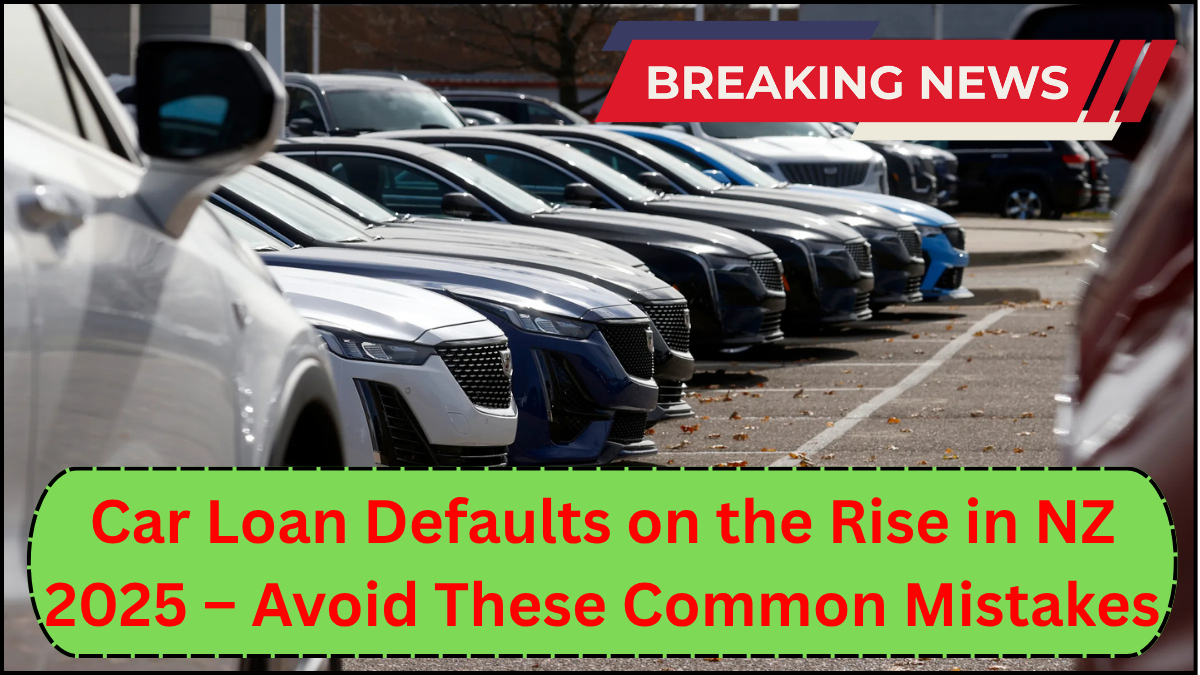In 2025, car loan defaults hit high in NZ, sparking growing concern across financial sectors. Rising inflation, increased cost of living, and interest rate hikes have made it harder for many New Zealanders to meet their repayment obligations. If you’re planning to finance a vehicle or currently paying off a car loan, understanding the common pitfalls can help you stay on track and protect your financial health.

Why Are Car Loan Defaults Increasing?
Several factors are contributing to the spike in car loan defaults across New Zealand:
- Inflation and Rising Interest Rates: As the Reserve Bank tightens monetary policy to combat inflation, interest rates have climbed. Borrowers with variable-rate car loans are facing higher monthly repayments.
- Cost of Living Pressures: Fuel, insurance, maintenance, and general household expenses are all up. Many people are prioritizing essential needs over debt repayment.
- Over-Borrowing: Some buyers take on more than they can afford, misjudging future expenses or relying on overly optimistic income projections.
Mistake #1: Ignoring the Total Cost of Ownership
One of the most common errors is focusing only on the loan repayment amount and ignoring the full cost of owning a car. This includes:
- Insurance premiums
- Road user charges (RUC) and registration
- Fuel and ongoing maintenance
- Depreciation
Example: A borrower might budget $600 a month for loan payments, but overlook $250 in fuel, $120 in insurance, and $100 in maintenance—a mistake that quickly leads to financial strain.
Mistake #2: Taking Out a Loan With a Poor Credit Score
Many New Zealanders underestimate the credit score impact when applying for a car loan. A low score often means higher interest rates or less favourable terms.
- Tip: Before applying, check your credit report with agencies like Centrix or Equifax. Correct errors, pay down other debts, and demonstrate stable income.
- Impact: Improving your score even slightly can save thousands in interest over the life of your loan.
Mistake #3: Choosing Long-Term Loans to Lower Monthly Payments
Extending a loan to 6, 7, or even 8 years may lower monthly costs but dramatically increases total interest paid. It also keeps you “upside down” on your loan longer—owing more than the car is worth.
Better Strategy: Opt for the shortest loan term you can reasonably afford, ideally no more than 5 years.
Mistake #4: Skipping the Fine Print
Loan contracts often contain:
- Early repayment fees
- Mandatory insurance add-ons
- Balloon payments at the end of the term
Always read the full terms and ask questions before signing. Don’t be rushed by a pushy dealer or lender.
Mistake #5: Relying on Dealer Finance Without Comparison
Dealer finance may seem convenient, but it’s rarely the most cost-effective option.
Smart Move: Shop around with banks, credit unions, and online lenders. Pre-approval can also strengthen your negotiation power at the dealership.
The Long-Term Risk: Damaged Credit and Repossession
When car loan defaults hit high in NZ, the ripple effects include:
- Damaged credit history: Missed payments severely hurt your score, limiting access to future loans or rental agreements.
- Repossession: Lenders can seize your vehicle, often without much warning, and sell it to recover losses.
Both scenarios can follow you for years, affecting everything from mortgage approval to job applications.
Proactive Tips to Avoid Default
- Create a realistic budget that includes all car-related costs
- Avoid new car purchases if your financial situation is uncertain
- Build an emergency fund to cover at least 3 months of loan repayments
- Contact your lender early if you anticipate missing a payment
FAQs
Q: What should I do if I can’t make my car loan payment?
A: Contact your lender immediately. Many offer hardship options or revised repayment plans to help you avoid default.
Q: How long do car loan defaults stay on my credit report in NZ?
A: Defaults typically stay on your credit file for five years, significantly impacting your future borrowing potential.
Q: Is refinancing a good option if I’m struggling with payments?
A: It can be, especially if you qualify for a lower interest rate. But watch for fees and extended terms that might increase your total repayment.
Q: Does a co-signer help if I have a low credit score?
A: Yes, a co-signer with a strong credit history may help you secure better loan terms, but they are equally responsible if you default.
click here to learn more